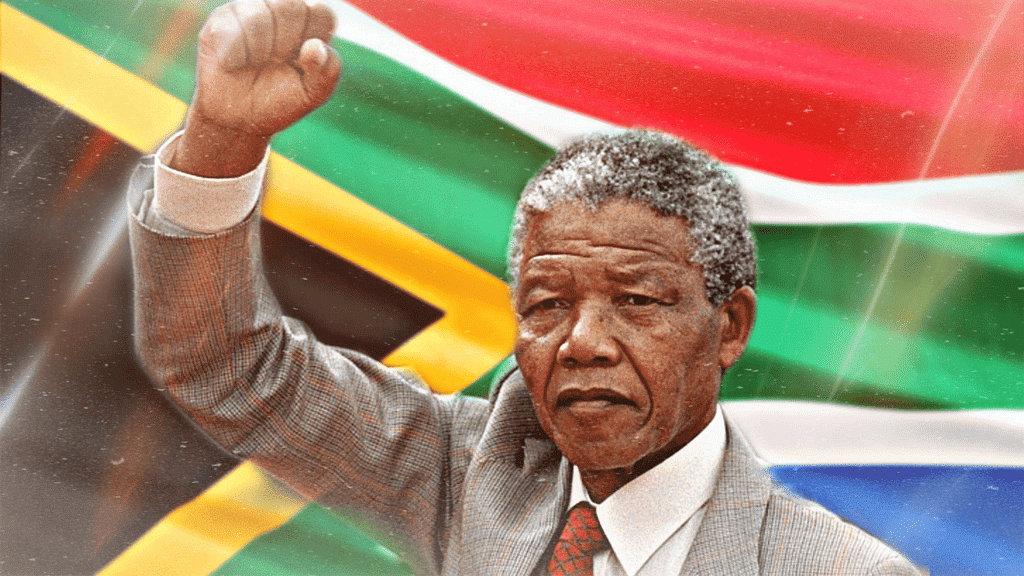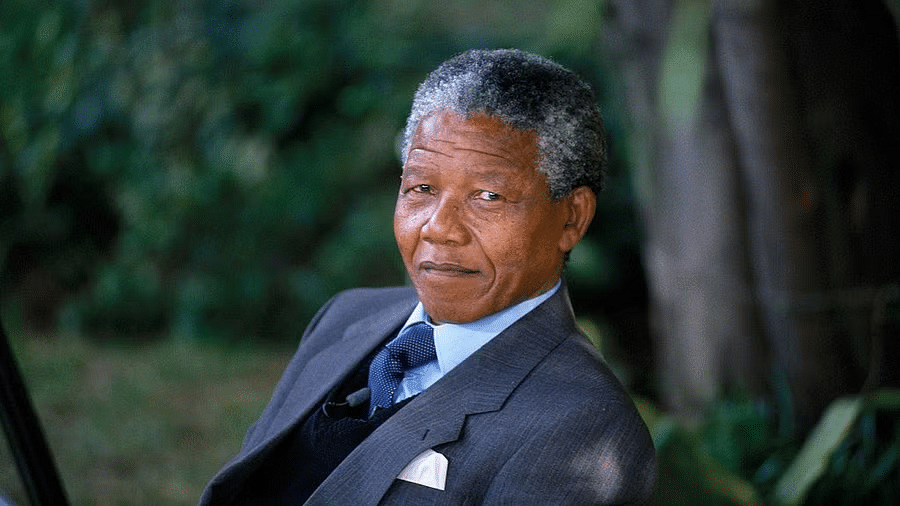Nelson Mandela - Long Walk to Freedom Summary Class 10 English First Flight Chapter 2
| Table of contents |

|
| Key Points of the Story |

|
| Detailed Summary |

|
| Theme /Message |

|
| Difficult Words |

|
Key Points of the Story
- Long Walk to Freedom is the autobiography of Nelson Mandela, who was the former South African President. This article is for Nelson Mandela long walk to freedom summary.
- It includes the description of the inauguration ceremony and citations from his speech and about his journey to being a freedom fighter. It says about the other countless people who fought for their freedom.
- In South Africa, a brutal practice named “apartheid” was very popular in those days. It referred to the discrimination between people on the basis of their race and colour.

- It was one of the most brutal societies in which dark-skinned people were deprived of their basic rights. This lesson gives us an overview of the struggles of Mandela for making the society with no discrimination on the basis of their colour, caste, race, age or gender.
Detailed Summary
On May 10th, Nelson Mandela reflects on his inauguration as the first black President of South Africa, a day that marked the end of apartheid and the beginning of a new era of democracy in the country. The day was bright and clear, filled with the presence of dignitaries and world leaders who had come to witness this historic event. The ceremony took place at the Union Buildings in Pretoria, a location that had long been a symbol of white supremacy but was now the site of a diverse gathering of people from different races and nations.
 Nelson Mandela
Nelson Mandela
During the ceremony, Mandela was accompanied by his daughter Zenani. He watched as F.W. de Klerk was sworn in as the second deputy president, followed by Thabo Mbeki as the first deputy president. When it was his turn, Mandela pledged to uphold the Constitution and work for the well-being of the country and its people. In his speech, he spoke of the long struggle against the injustices of apartheid, expressing gratitude to the international community for supporting South Africa’s fight for justice, peace, and human dignity. Mandela emphasized that South Africa had finally achieved political freedom and vowed that the country would never again experience oppression.
As the ceremony continued, South African jets, helicopters, and troop carriers flew in perfect formation over the Union Buildings, symbolizing the military's loyalty to the newly elected democratic government. Mandela was deeply aware that not long ago, the same military leaders who were now saluting him might have arrested him for his anti-apartheid activities. The day was also marked by the playing of two national anthems, with whites singing "Nkosi Sikelel' iAfrika" and blacks singing "Die Stem," representing the unity of a nation that had once been bitterly divided. Racial Domination
Racial Domination
Mandela reflected on the history of South Africa, recalling how in the early 20th century, the white population had established a system of racial domination. This system created one of the harshest and most inhumane societies in the world. However, by the late 20th century, that system had been dismantled, replaced by a government that recognized the rights and freedoms of all people. Mandela acknowledged the immense sacrifices made by countless individuals who fought for freedom, many of whom would never see the fruits of their struggle.
The policy of apartheid left deep scars on the people of South Africa, wounds that would take generations to heal. Yet, Mandela recognized that the oppression also produced leaders of extraordinary courage and wisdom, such as Oliver Tambo, Walter Sisulu, and others, whose contributions to the struggle for freedom were immeasurable. For Mandela, the greatest wealth of South Africa was not its minerals or gems but its people, who showed remarkable resilience and strength in the face of adversity.
Mandela learned from his comrades that courage was not the absence of fear but the triumph over it. He believed that no one is born hating another person because of their skin color, background, or religion. People learn to hate, but they can also learn to love, for love comes more naturally to the human heart. Even in the darkest times, Mandela saw glimmers of humanity in others, which gave him hope.
Mandela reflected on the dual obligations every person has—one to their family and the other to their community and country. In South Africa, fulfilling these obligations was almost impossible for black people under apartheid. Mandela’s journey began with a personal desire for freedom but evolved into a greater hunger for the freedom of his people. He realized that his own freedom was meaningless if others were not free. For Mandela, true freedom meant the liberation of both the oppressed and the oppressor, as both are dehumanized by the system of oppression.
Theme /Message
Theme:
- Courage and Resilience:
Mandela's life story emphasizes the central theme of courage and resilience.
He faced numerous obstacles but overcame them through his own strength and determination. - Will Power:
Mandela's success is attributed to his strong willpower and determination.
His achievements showcase the importance of personal courage in overcoming challenges. - Inspiring Example:
The chapter serves as an inspiring example of the fight for justice.
It highlights the power of love, friendship, forgiveness, and unity in the quest for freedom. - Life Lessons:
Mandela's life underscores the key lessons of courage, resilience, and willpower for success.
The theme emphasizes that these qualities are essential for achieving one's goals. - Struggle Against Oppression:
Mandela stands out for his strong faith in justice and his unwavering struggle against oppression.
His story encourages the reader to strive for what is right and fight against injustice.
Message:
- The moral of the story is that the oppressor and the oppressed both lose humanity. One through hatred and the other through oppression and hence both need to be liberated from these inhumane prisons.
- The story also emphasizes the importance of working together for a common purpose, despite differences in race or gender. Finally, it shows that long-term change can only be achieved by a collective effort and not just by an individual’s efforts alone.
Difficult Words
- Pleasantly – sweetly. (Raju spend his weekend pleasantly)
- Besieged – closed. (The accident place was beside by the media)
- Dignitaries – Famous person (In our school annual function many of the highest dignitaries are also present).
- Inauguration – Opening (On the Occasion of Ramu’s office inauguration our all family members also invited.)
- Supremacy – controlling (Her supremacy in debates is such awesome).
- Installation – install (Raju restarts his phone to complete installation)
- Accompanied – partner (He was accompanied his life partner during their tough time).
- Pledged – promised (Raju had pledged his parents to obey their every words).
- Devote – Dedicate (Rita devotes her life to helping the poor children).
- Assembled – gather (Roma assembled her all old books to gave them poor children).
- Liberty – Feel free (All human being wants love and library).
- Extraordinary – Uncommon (Everyday wants to watch Roma’s extraordinary dance moves).
- Disaster – something happens unfortunately (The government has promised to gave money to poor people for disaster).
- Privilege – special right (His privilege always makes him proud).
- Distinguished – special person
- Possession – custody (The part of this house is in possession).
- Emancipation – releasing (You must fight for your own emancipation).
- Deprivation – loss
- Oppression – suffering (oppression makes a person totally mad)
- Discrimination – Differentiation (I don’t support the social discrimination).
- Glorious – famous (Our country is a glorioles country).
- Despised – disrespect (Raju despised his own grandparents for their health issues).
- Erected – Build up (A small temple was erected near the market).
- Recognise – know (You doesn’t recognise me).
- Profound – dense (He has a profound knowledge on English literature)
- Resilience – the ability of patience (Her strong resilience helps her to survive this critical situation).
- conquers – Win (They will conquer their battle).
- Extinguish – End (please extinguish all candles in the room)
- Inclination – desire (Ramu didn’t showed any inclination whatever happened all time).
- Inevitably – surely (This time you can go, but you must inevitably coming next month)
- Transitory – unstable (Everything is transitory in this world).
- Illusion – fake (It was just an illusion so came back on reality).
- Curtailed – limited (I tried to curtailed my pocket money)
- Virtuous – pious (Always virtuous person is pure by their heart).
|
30 videos|419 docs|58 tests
|
FAQs on Nelson Mandela - Long Walk to Freedom Summary Class 10 English First Flight Chapter 2
Ans. The author of the book "Long Walk to Freedom" is Nelson Mandela.
2. What is the main theme of "Long Walk to Freedom"?
Ans. The main theme of "Long Walk to Freedom" is Nelson Mandela's journey from imprisonment to becoming the first black president of South Africa.
3. What are some key points in Nelson Mandela's life as depicted in the book?
Ans. Some key points in Nelson Mandela's life as depicted in the book include his activism against apartheid, his imprisonment for 27 years, and his role in the peaceful transition to democracy in South Africa.
4. What message does Nelson Mandela convey through his book "Long Walk to Freedom"?
Ans. Through his book "Long Walk to Freedom," Nelson Mandela conveys a message of perseverance, forgiveness, and the importance of fighting for justice and equality.
5. What difficult words or vocabulary can readers expect to encounter in "Long Walk to Freedom"?
Ans. Readers can expect to encounter difficult words such as apartheid, activism, imprisonment, democracy, perseverance, and equality in "Long Walk to Freedom."

|
Explore Courses for Class 10 exam
|

|


















